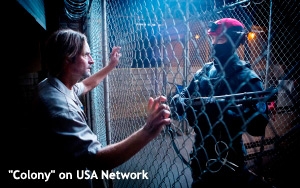Commentary
USA Network's 'Colony' Asks: What If America Was Living Under A Dictatorship?
- by Adam Buckman , Featured Columnist, January 14, 2016
 The future looks grim. Or maybe it’s the present.
The future looks grim. Or maybe it’s the present.
Whatever time period this is supposed to be, this new drama series on USA Network called “Colony” paints a dark picture of life in these United States under some sort of military dictatorship.
That’s the concept of this “what if” series premiering Thursday night (Jan. 14). The location is Los Angeles -- sunny and warm but with an undercurrent of uncertainty, to say the least.
The best feature of the series premiere is that you don’t really know what’s going on, and you will still know very little by the time it’s over. And instead of scratching your head over what you have just seen, you can’t wait to see Episode Two in the hopes of finding out more.
advertisement
advertisement
The secret sauce is this show’s almost total lack of exposition. Many shows go the opposite way. No doubt you have watched the premiere episodes of some new shows and have heard those stilted, awkward speeches the writers give some of the characters in which they suddenly blurt out their entire life histories.
Under the guidance of network supervisors, scriptwriters do this because the networks have no faith in the intelligence and attention spans of their viewers. They seem to believe that viewers will not stick around for long if you don’t immediately lay out all the facts and let them in on every character’s origin story.
In “Colony,” you are left to deduce most of it for yourself from mostly visual clues, which marks this series as a television rarity – a TV show that doesn’t insult your intelligence.
As the first episode unfolds, you see the city of Los Angeles. At first, life seems normal. Then little by little, you realize it’s not. For one thing, there are few cars on the streets and many people on bicycles. And you begin to learn that the city is experiencing various shortages of goods we take for granted -- fuel, eggs, coffee, insulin, even whiskey.
Eventually, you come to understand that an authoritarian government controls the city. In the premiere, you don’t learn if it's a foreign power, aliens from outer space or the U.S. government itself. You don’t learn the time frame either. Except for some futuristic airborne drones that keep watch on the nervous citizenry, it might as well be 2016. After all, we already have these drones, and they can do just about anything, can’t they?
So, what is “Colony” supposed to be anyway? What’s it based on? Nazi Germany? The Soviet Union? Communist China in the era of Mao? All of the above, with a few other infamous dictatorships thrown in?
In addition to enduring everyday deprivations of staple foods and supplies, the people suffering under this mysterious occupation live in constant fear of sudden arrest. They could be having lunch at a sunny outdoor café when a motorcade of black SUVs with their windows blacked-out can suddenly roll up, and troopers in red helmets will suddenly emerge to snatch someone up and hustle him away.
It’s an unsettling experience -- as much for the characters in the show as for those of us watching at home. “Colony” was created by producers Carlton Cuse (“Lost,” “The Strain,” “Bates Motel”) and Ryan Condal. It stars Josh Holloway (also seen in “Lost”) and Sarah Wayne Callies (“The Walking Dead”).
Perhaps the most discomfiting feature of “Colony” is that it is clearly not meant to come across as some kind of futuristic science fiction. On the contrary, despite all the authoritarian traits that gradually become apparent on the show, the society seen on “Colony” seems not that far removed from the one we’re living in now, or could live in soon.
“Colony” premieres Thursday (Jan. 14) at 10 p.m. Eastern on USA Network.



